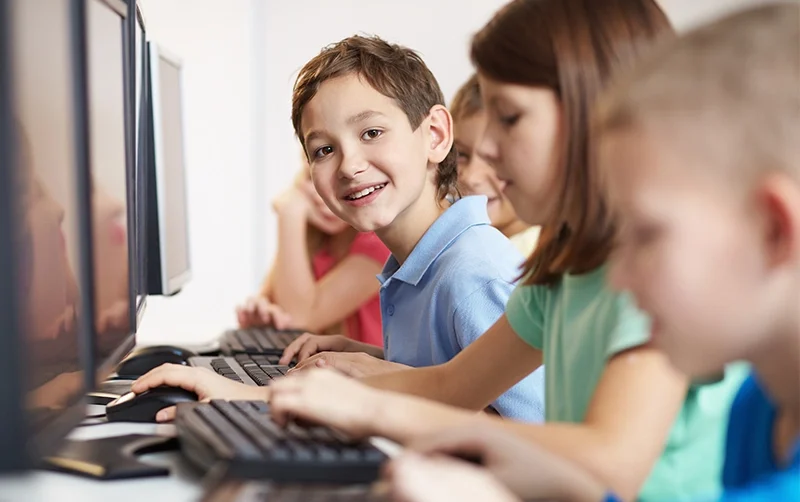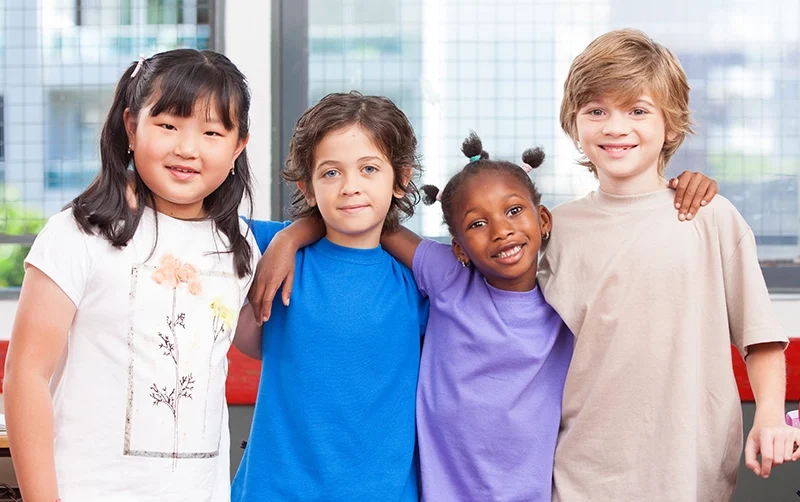Embracing Transdisciplinary Education: Empowering Students for Lifelong Success at Dynamics International School

In the dynamic landscape of education, it is crucial to embrace approaches that recognize and celebrate the unique learning differences of every student. At Dynamics International School, we firmly believe that learning differences are not obstacles but opportunities to teach students differently and grow together. We have adopted a transdisciplinary education approach that fosters an inclusive learning environment and empowers all children to reach their full potential. In this blog post, we will explore the importance of transdisciplinary education, how it is implemented at Dynamics International School, and the positive impact it has on our students. Understanding Transdisciplinary Education: Transdisciplinary education is an approach that goes beyond the boundaries of individual subjects and integrates various disciplines to create a holistic learning experience. It emphasizes the interconnectedness of knowledge and encourages students to make meaningful connections across different subject areas. This approach helps students develop critical thinking skills, fosters a deeper understanding of concepts, and prepares them to tackle real-world challenges. The Benefits of Transdisciplinary Education: Enhanced learning experiences: Transdisciplinary education provides students with rich and meaningful learning experiences. By exploring topics from multiple perspectives, students develop a deeper understanding of the subject matter and make connections across various domains of knowledge. Holistic development: Transdisciplinary education nurtures the development of the whole child. By incorporating life skills such as communication, motor skills, self-regulation, and emotional awareness, students are equipped with the necessary tools to succeed not only academically but also in their personal and social lives. Inclusivity and individualized learning: The transdisciplinary approach recognizes and values the diverse learning needs of students. By incorporating specialized strategies from a team of therapists, teachers at Dynamics International School ensure that each student receives the support they require to thrive. Critical thinking and problem-solving skills: Through transdisciplinary education, students develop essential skills such as critical thinking, problem-solving, and creativity. They learn to approach complex problems from different angles, think innovatively, and collaborate effectively. Real-world relevance: Transdisciplinary education prepares students for real-world challenges by engaging them in authentic learning experiences. It helps them understand the interconnectedness of knowledge and its applications in various contexts, fostering their ability to transfer their learning to practical situations. Implementation of Transdisciplinary Education at Dynamics International School: Specialized team of therapists: At Dynamics International School, we have a dedicated team of Occupational, Speech, Educational, Behavioral, and Psychological Therapists. These therapists collaborate with teachers to provide targeted support and interventions for students with diverse learning needs. Their presence in the classroom ensures that individualized strategies are implemented effectively. Co-teaching and collaboration: Therapists join teachers in the classroom to co-teach specific skills, whether academic or life skills. By working together, they integrate their expertise seamlessly into the curriculum, ensuring that all students receive comprehensive support and guidance. Thematic curriculum: Dynamics International School utilizes the Cambridge and International Primary Curriculum, which aligns well with the transdisciplinary approach. Thematic topics are explored through multiple subject areas, allowing students to make connections and deepen their understanding. Individualized learning plans: Students at Dynamics International School benefit from individualized learning plans tailored to their specific needs. These plans are collaboratively developed by teachers, therapists, and parents, ensuring that every student receives the support necessary to thrive academically and personally. The Transformative Power of Transdisciplinary Education: The implementation of transdisciplinary education at Dynamics International School has yielded transformative outcomes for our students. By embracing this approach, we have witnessed remarkable growth in their academic performance, self-confidence, and overall development. Students who may have initially struggled with certain subjects or skills have found success through the collaborative efforts of our transdisciplinary team. The integration of specialized strategies from therapists into the classroom has enabled personalized support, allowing every student to thrive. Moreover, transdisciplinary education has nurtured a love for learning among our students. By exploring topics through multiple subject areas and engaging in hands-on, real-world experiences, they have developed a deep curiosity and enthusiasm for knowledge. They have become active participants in their own learning journey, eagerly seeking connections and applying their understanding in meaningful ways. The holistic approach of transdisciplinary education has not only improved academic outcomes but also fostered essential life skills. Our students have developed effective communication skills, critical thinking abilities, and emotional intelligence. They have learned to collaborate, problem-solve, and adapt to new situations, preparing them for success in their future endeavors. Furthermore, transdisciplinary education has had a profound impact on our school community as a whole. It has strengthened the collaboration between teachers, therapists, and parents, creating a unified support system for our students. The shared commitment to their growth and development has resulted in a nurturing and inclusive environment where everyone feels valued and empowered. In conclusion, transdisciplinary education at Dynamics International School has proven to be a transformative approach that unlocks the potential of every student. By recognizing learning differences as opportunities for growth and employing a team of dedicated therapists and teachers, we provide a comprehensive and personalized educational experience. Our students thrive academically, socially, and emotionally, equipped with the skills and mindset necessary for lifelong success. Through transdisciplinary education, we are shaping future leaders who are confident, adaptable, and ready to make a positive impact in the world.
Educational Therapy: Empowering Students in Dynamics International School’s Transdisciplinary Approach

Introduction: At Dynamics International School, we believe in providing a comprehensive and inclusive education that addresses the diverse needs of our students. As part of our transdisciplinary approach, we incorporate educational therapy to support students who require specialized interventions to reach their full potential. In this blog post, we will explore the concept of educational therapy, its importance within our school’s educational framework, and the transformative impact it has on our students’ learning and development. Understanding Educational Therapy: Educational therapy is a specialized form of intervention that focuses on addressing learning challenges and supporting the overall educational development of students. It combines elements of education, psychology, and therapeutic techniques to create tailored interventions that target specific learning difficulties. Educational therapists work collaboratively with students, parents, teachers, and other professionals to identify and address academic, cognitive, emotional, and behavioral concerns that may hinder a student’s progress. The Transdisciplinary Approach at Dynamics International School: Holistic learning: Our transdisciplinary approach emphasizes the interconnectedness of various domains of learning. We recognize that students’ academic success is influenced by their cognitive, social-emotional, and physical well-being. By integrating educational therapy into our curriculum, we ensure a comprehensive and holistic learning experience that addresses the unique needs of each student. Collaboration and shared expertise: Dynamics International School fosters collaboration among educators, therapists, and specialists to create a cohesive support system for students. Educational therapists work closely with teachers, occupational therapists, speech-language pathologists, and other professionals to develop personalized interventions that are seamlessly integrated into the classroom environment. Individualized support: Educational therapy allows for individualized support tailored to the specific needs of each student. Through ongoing assessment, observation, and collaboration, educational therapists identify learning difficulties, develop targeted interventions, and provide strategies that enable students to overcome challenges and achieve academic success. Skill development and intervention: Our transdisciplinary team employs evidence-based interventions to address a wide range of learning difficulties, including reading comprehension, math skills, executive functioning, study skills, and social-emotional development. Educational therapists utilize various instructional techniques, multisensory approaches, and assistive technologies to support students in acquiring and applying essential skills. Progress monitoring and data-driven decision-making: Educational therapists continuously monitor students’ progress, collect data, and analyze outcomes to inform their interventions. This data-driven approach ensures that interventions are evidence-based, effective, and responsive to the individual needs of each student. The Importance of Educational Therapy: Addressing learning challenges: Educational therapy plays a crucial role in identifying and addressing learning challenges that students may face. By targeting specific areas of difficulty, such as dyslexia, attention-deficit/hyperactivity disorder (ADHD), or executive functioning deficits, educational therapists provide strategies and interventions that support skill development and academic progress. Building self-confidence and motivation: Students who experience learning difficulties often face feelings of frustration, low self-esteem, and reduced motivation. Educational therapy helps to build their self-confidence by providing tailored support, helping them develop effective learning strategies, and celebrating their achievements. This positive reinforcement promotes a growth mindset and enhances their overall motivation and engagement in the learning process. Promoting independence and self-advocacy: Educational therapy equips students with essential learning tools and strategies that foster independence. Students learn to identify their strengths, weaknesses, and individual learning styles, empowering them to self-advocate for accommodations and support when needed. These skills extend beyond the classroom and prepare students for lifelong learning and success. Enhancing academic performance: By targeting specific learning challenges, educational therapy improves academic performance across various subject areas. Educational therapists collaborate with teachers. Conclusion: Incorporating educational therapy within Dynamics International School’s transdisciplinary approach is instrumental in supporting students who require specialized interventions to overcome learning challenges. By integrating educational therapy into our curriculum, we create a holistic and inclusive learning environment that fosters the academic, cognitive, social-emotional, and behavioral development of our students. The collaborative efforts of educational therapists, teachers, and other professionals ensure that each student receives personalized support and interventions tailored to their unique needs. Through educational therapy, we empower our students to build essential skills, develop self-confidence, and achieve academic success. At Dynamics International School, we remain committed to providing comprehensive and individualized education that enables every student to thrive.
Celebrating Differences: The Importance of Promoting Cultural Diversity and Inclusion in Education

In today’s interconnected and diverse world, promoting cultural diversity and inclusion in education is crucial. Embracing and celebrating differences among students not only creates a vibrant and inclusive learning environment but also prepares them to navigate and thrive in a global society. In this blog post, we will explore the significance of promoting cultural diversity and inclusion in education and how it benefits students. The Importance of Promoting Cultural Diversity and Inclusion: Global awareness and perspective: Cultural diversity in education exposes students to a variety of perspectives, traditions, languages, and experiences from around the world. This helps students develop global awareness, respect for different cultures, and a broader understanding of the world they live in. Enhancing social and emotional development: Embracing cultural diversity fosters empathy, tolerance, and acceptance. Students learn to appreciate differences, challenge stereotypes, and develop the social and emotional skills necessary to engage positively with individuals from various backgrounds. Academic excellence and critical thinking: Culturally diverse classrooms encourage critical thinking and creativity. Exposing students to diverse perspectives and knowledge systems enhances their ability to think critically, solve complex problems, and approach challenges from multiple angles. Building inclusive communities: Promoting cultural diversity and inclusion creates a sense of belonging and fosters positive relationships among students, staff, and families. It cultivates an inclusive community where all individuals are valued, respected, and supported. Preparing for a diverse future: As students enter a global society and workforce, they need to be equipped with the skills to work collaboratively with individuals from diverse backgrounds. Embracing cultural diversity in education prepares students to be adaptable, culturally competent, and effective communicators in multicultural settings. Strategies for Promoting Cultural Diversity and Inclusion: Inclusive curriculum: Implement a curriculum that incorporates diverse perspectives, histories, and cultural elements. Include literature, art, history, and celebrations from different cultures, promoting understanding and appreciation for diversity. Culturally responsive teaching practices: Employ teaching practices that value and integrate students’ cultural backgrounds into instruction. This includes incorporating culturally relevant examples, promoting inclusive discussions, and honoring students’ diverse perspectives. Celebrating diversity: Organize multicultural events and activities where students can showcase their cultural heritage and learn about different cultures. These events provide an opportunity for students to celebrate diversity, fostering a sense of unity and respect. Intercultural experiences: Facilitate intercultural experiences through partnerships with schools from different countries or virtual exchange programs. These experiences allow students to engage with peers from diverse backgrounds and develop intercultural understanding. Promote inclusive dialogue: Encourage open and respectful dialogue about cultural differences and promote understanding among students. Provide opportunities for students to share their experiences and perspectives, fostering empathy and a sense of belonging. Benefits of Promoting Cultural Diversity and Inclusion: Enhanced learning outcomes: Students in culturally diverse and inclusive educational settings demonstrate higher academic achievement, increased engagement, and improved cognitive skills. Exposure to different cultures and perspectives broadens their understanding and enhances their overall learning experience. Empathy and social skills development: Promoting cultural diversity and inclusion fosters empathy, understanding, and social skills in students. They learn to value diversity, challenge stereotypes, and develop effective communication and collaboration skills. Global citizenship and cultural competency: By embracing cultural diversity, students develop global citizenship attributes and become culturally competent individuals. They are better prepared to navigate an interconnected world with respect, empathy, and appreciation for different cultures. Promoting cultural diversity and inclusion in education is essential for preparing students to thrive in a diverse and interconnected world. By embracing and celebrating differences, students develop a global perspective, empathy, critical thinking skills, and a sense of belonging. Dynamics International School recognizes the significance of promoting cultural diversity and inclusion and is dedicated to creating an inclusive learning environment where students from all backgrounds feel valued, respected, and supported. Together, let us continue to foster a culture of acceptance, appreciation, and celebration of diversity in education, empowering our students to become compassionate global citizens who can contribute positively to society.
























